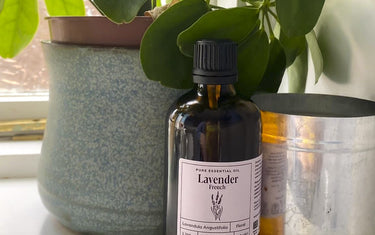9 min read / 9 January 2023 / Laura Garvin Gomez
How to Use Lavender Oil for Anxiety
This floral favourite will help keep anxiety levels at bay. Here's how to add it to your practices.

Anxiety is becoming a wider and greater concern for many of us.
Statistically, it is said that 31.1% of the general population will suffer from some form of anxiety disorder at one point in their lives.
Even for the lucky few that manage to avoid it at this level, experiencing anxious feelings before major events or anticipatory moments is a prospect we all face - and it can be incredibly uncomfortable without the proper practices to quell it.
Those with chronic anxiety conditions may be prescribed any number of medications to help ease their minds and calm their symptoms.
While these are mostly effective, they can come with unpleasant side effects that aren't always suitable for the sufferer to live with.
Some medications also don't necessarily provide instant relief during attacks, where sensory overload can become a massive issue and quick resolves are generally preferred.
Natural therapies like lavender essential oil therefore provide an apt solution for calming the mind during these particularly pressing moments - filling in the gaps that medication can't always reach.
Lavender oil is also a great choice for those that aren't necessarily suffers of the condition, but do experience anxious feelings from time to time.
We'll be exploring how to use lavender oil for anxiety, why it works, and when it's best to implement.

What is lavender essential oil?Lavender oil is an incredibly popular asset to the world of aromatherapy, and is sometimes nicknamed the "mother of aromatherapy" for its invaluable benefits to both the body and the mind. Detectable by the botanical name Lavandula Angustifolia, or "true lavender", the oil has a pleasant floral scent with a light freshness that is said to promote calm, peace, and serenity. While there are other subspecies of lavender out there, such as spike lavender or the botanically similar lavandin, true lavender is the most studied and revered for its benefits to holistic health. All lavender types are usually extracted via steam distillation, and the most common true lavender strains can be found in France, Bulgaria, and the UK. |
Benefits of lavender oil for anxiety
When it comes to tackling general anxiety disorder (GAD) and stress, there is no greater essential oil than lavender to have at your disposal.
1) It activates the limbic system
Scientists believe that inhaling lavender can help us activate the limbic system - an area of the brain that helps us cope with and process emotions.
The limbic system contains two valuable locations responsible for a rise or fall in anxiety levels: the hypothalamus and the hippocampus.
The former focuses on capturing the signals of anxiety, whereas the latter helps to regulate them.
Inhaling lavender thus affects our fight-or-flight responses, which are usually the trigger for unpleasant symptoms, and can help our bodies calm down without sedative effect or withdrawal symptoms.
2) It contains linalool
A 2018 study based in Japan noted lavender's natural constituent linalool as the responsible attribute towards its affect on the brain.
Linalool's positive effects are particularly useful when it came to stimulating the olfactory - another area of the limbic system that is triggered by scent and is responsible for regulating mood, heart rate, and blood pressure.
This is what allows lavender to not only mentally soothe us, but also physically calm us down during moments of pressure.
3) It can prevent anticipatory anxiety
If you are not a sufferer of GAD or chronic anxiety, lavender oil can still help to calm your mind and body in a very similar way when leading up to a particularly anxiety-inducing event.
One 2016 study tested the effects of inhaling lavender oil versus an unscented oil on women going into breast surgery. Those that inhaled the lavender had a statistically significant increase in positive feelings compared to the placebo oil.
A similar 2018 study also came to the same conclusion, noting that the use of lavender essential oil before surgery sparked greater levels of calm in patients.
This means that carrying a little bottle of lavender oil with you to inhale before a medical procedure, important exam, or other related event could help improve levels of composure - both physically and mentally.

Does lavender oil help with sleep?
Sufferers of anxiety may find themselves dealing with issues surrounding sleep, on top of other existing symptoms.
Even for those without the condition, trying to sleep the night before an important event can be trying to say the least.
Thankfully, lavender's calming effects on the limbic system further extend themselves to sleeping well, and lavender has become an equally infamous remedy in this regard as it has for anxiety and stress.
This is because improvements in both issues essentially occur simultaneously, with researchers in 2015 confirming the root solution as the same - lavender's effect on the mind.
Learning how to use lavender oil for sleep can therefore further improve anxiety levels throughout the evening.
Lavender oil for other mental health issues
Sadly, it is not uncommon for many sufferers of anxiety to also deal with other mental health issues. Thankfully, you can use lavender oil for more than just anxiety.
Using lavender oil for depression
This is particularly true for depression, with a 2020 scholarly article noting that around 40% of patients with major depressive disorder also experience anxiety issues in the same time frame.
Using lavender oil for postpartum depression
A 2012 study assessing the effects of lavender oil on high-risk postpartum women found a positive decrease in the symptoms surrounding anxiety and depression across a four-week period, with a similar 2016 study also discovering the same.
Scientists are once again pinning these findings to the effectiveness of linalool, however further research is still ongoing as to why lavender is so truly beneficial for our mental health.

How to use lavender oil for anxiety
There are many impactful ways to implement lavender into your routine.
Whether you experience the odd bout of anxiety or find yourself coping with it every day, each of these uses can lend themselves positively to your physical and emotional state.
Inhalation
As most of the research surrounding lavender oil includes some sort of inhalation, it is safe to assume that this is one of the most effective methods you could implement for anxiety.
Aromatherapy is an easy practice to get into, particularly if you already have a diffuser or oil burner to hand - though these are not necessarily essential tools.
It is also the only way to stimulate the olfactory bulb, which picks up information from certain smells detected by the nose and passes it through the areas of the brain relating to emotion and memory.
Most scientists recommend at least three minutes of inhalation for any effect to take place, however some sources recommend up to half an hour of aromatherapy for a longer-lasting solution.
Simply add five to seven drops of lavender essential oil to your chosen diffuser and allow the scent to fill the room.
Alternatively, you can add a few drops to a cotton ball or tissue and draw it close to your nose. There are also several other ways to use essential oils without a diffuser.
Bath
Aromatherapy can also be achieved by sprinkling some lavender essential oil into a hot bath.
Baths themselves are generally recommended amongst medical practitioners as a way to temporarily self-soothe against the effects of anxiety, and incorporating lavender into this practice can only further improve its effects.
Taking a bath also activates your parasympathetic nervous system and helps ease your body into relaxation, much like lavender itself has been proven to do.

Massage
Performing a massage on yourself, or having someone do it for you, is a widely recognised practice for reducing stress and anxiety levels.
No only that, but a study in 2020 found that massages using lavender oil are one of the most common complimentary therapies in the UK, meaning the scent alone is likely to place you in the ideal mood to receive one.
Adding some lavender essential oil to a soothing carrier oil base like jojoba can help to mentally soothe the mind as well as physically calm to body, with some studies suggesting that massages may even be more effective for reducing anxiety than inhalation alone.
Lavender oil has also gained traction for its pain-relieving qualities, meaning stubborn aches or pains can be targeted through this technique alongside any emotional ailments.
Despite lavender being a gentler essential oil, it should still never be applied undiluted to the skin, as doing so may cause unpleasant irritation, redness, or rashes.
It is also good practice to perform a patch test before use, particularly if you've never topically applied essential oils before.
Capsules
Many medical professionals recommend lavender oil capsules as another solution for long-term anxiety issues.
Usually, a good dosage to begin with is around 80 to 160 mg per day, though it is important to consult with your doctor before purchasing lavender capsules as they have been known to interact with other medications.
Unlike the other methods on this list, capsules can take up to two weeks to work and will not be felt with immediacy, so they may not be the best choice if you're seeking a quick fix for symptoms of anxiety.
It is also important to note that lavender oil capsules are not the same as ingesting undiluted lavender oil. Ingestion is never recommended as essential oils are extremely potent and could cause internal damage to the body.
What other essential oils are good for anxiety?
While lavender is undoubtedly the strongest contender against anxiety and stress, it is not the only essential oil with powerful attributes behind it.
Some other notable essential oils include:
Like lavender, these oils are known for stimulating the central nervous system and positively impacting the hippocampus, leading to reduced feelings of anxiety combined with a more relaxed temperament.
Citrus essential oils likebergamot are also known for being naturally uplifting, meaning they can inspire energy and balanced emotions in those with heightened stress levels.
Find out more about the top ten best essential oils for anxiety and stress, and why their impacts are so comparable to lavender.

Anxious thoughts and feelings can last anywhere from a couple of hours to a lifetime, depending on the severity of your particular situation.
For those in the latter category, trying to cope with the symptoms and side effects can seem like an endless line of woeful experiences, however natural remedies like lavender are a reminder that even the simplest of antidotes can have a positive effect.
Whether you choose to utilise lavender oil in your day-to-day routine or aim to keep it handy for any unexpected anxiety attacks, its renowned benefits are sure to safeguard you from the unpleasantries of the condition.
|
Product Name |
100% Pure Lavender Essential Oil |
| Botanical Name | Lavandula Angustifolia |
| Scent Type | Floral |
| Benefits & Uses | Calming, Sleeping Aid, Hair Care |
| Suitable for Diffusers? | Yes, this lavender essential oil is perfect for diffusers. |
| Suitable for Candles and Soaps? |
Yes, this lavender essential oil is perfect for candle and soap making. |
| Extraction Method | Steam Distillation |
| Bottle Type | Tamper proof and UV resistant |










